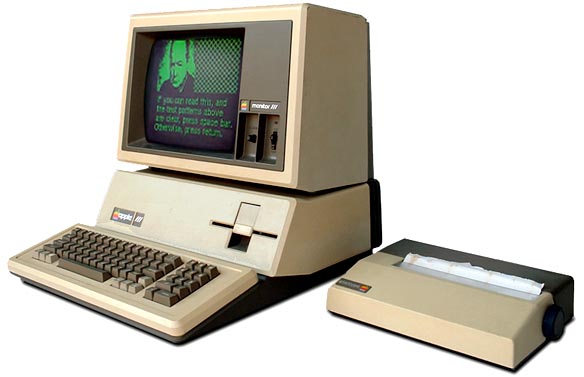 http://oldcomputers.net/appleiii.html
http://oldcomputers.net/appleiii.htmlThe question was, "Should we integrate technology into the classroom? ". The easy answer to that question is yes, absolutely. Technology is the driving factor behind everything we do. In the year 2014, who does not have a cell phone, or a smart phone for that matter? My 85 year old grandfather has one, my mother, my father and the 10 year old neighbor boy. Practically everyone has access to answers, solutions, suggestions to pretty much everything literally in the palm of their hand. Of course, there is always the fear of the unknown, the reliability of the information and the integrity of the work.
On numerous occasions, I get the random text from my mom saying "What is instagram, or I got this offer on my phone do you know anything about it?" To which I try to answer on my own if I know, but what I often find myself doing is google'ing it. I'm quite sure that's not an actual word, but I say it all the time and most often everyone understands. Technology in general is quite big and dare I say quite scary. In reading this article I discovered, I am not alone!
"I also hear people say, “How did you learn all this? I could never do all that. I’m just not good with technology.” You know what I tell them? I Google everything I want to know. I have never received training in 90% of what I do online. I just get curious (or get stuck) and do a quick internet search. I try it out and bookmark the site for my reference. After I’ve done it enough times, I’ve got it memorized. That’s all there is to it. I’m not the computer whisperer, and I wouldn’t even call myself an expert" http://thecornerstoneforteachers.com/2012/08/there-is-no-such-thing-as-a-technology-expert.html
Technology is ever changing second to second, which brings me to my second point, how reliable is the information that you are receiving? Anyone is able to start their own website that can look very official and sound as though they know what they are talking about. What if the students are relying on this information and committing it to truth. How can we eliminate the misuse of incorrect information? I decided to "google" to find out the best approach in eliminating misuse. Here is what I found "While Web literacy demands intelligent Internet use, Web literacy is really not qualitatively different than information literacy. All information has bias and has to succumb to rigorous evaluation. This was driven home to me when I worked for disaster relief and began exploring refugee statistics. Even when reading an article in The New England Journal of Medicine, it doesn’t hurt to look again — there may be an article in JAMA next month that refutes it.
And remember, while it is important to know what you’re getting, misinformation is often in the eyes of the beholder." http://www.infotoday.com/searcher/sep00/piper.htm
We know longer have to rely solely on the pages of an outdated textbook, we have so many opportunities at our disposal. We may not know all the answers, or know everything about technology but let's embrace it together. Let us engage each other!
""I also hear people say, “How did you learn all this? I could never do all that. I’m just not good with technology.” You know what I tell them? I Google everything I want to know. I have never received training in 90% of what I do online. I just get curious (or get stuck) and do a quick internet search. I try it out and bookmark the site for my reference. After I’ve done it enough times, I’ve got it memorized. That’s all there is to it. I’m not the computer whisperer, and I wouldn’t even call myself an expert" " I love this!!! Google is your best friend. I do like the fact too that you mention reliability. This is part of digital citizenship as well, digital literacy. Digital literacy is the ability to discern information and reliability of information on the internet. Of course we are not going to know if everything is reliable, but if we know some basics, that will help us at least question what we are reading.
ReplyDeleteI agree with you Jill, technology has changed the world and we all need to learn how to use technology (like your 85 years old grandfather and 10 years old neighbor boy). I believe technology makes communication easier, and we can find a lot of information on the Internet making teaching more interesting. However, like you said:” how can we eliminate the misuse of incorrect information?” It is very important for us to use reliable information and give students correct knowledge. Thank you for sharing.
ReplyDeleteJill, I like that the idea of "googling it" struck you as well. People are often mystified by technology, but the answers are literally one click away. I love that availability of information. I'm by no means a technology expert, but when I am curious, have a question, or don't know how to do something, I simply google it. We have a whole world at our fingertips, and that is a pretty amazing opportunity from an educational standpoint.
ReplyDelete